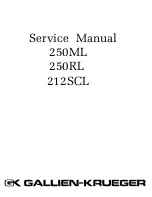
13 FX Loop 1/2
14 Reverb
This button switches to and fro between
and
. The red LED above
the button lights up to indicate
is on. You can also select loops via MIDI
program change or Custom Z-9 Footswitch.
Both effect loops can be configured in series (that is, 100% processed signal when
is set to
) or in parallel (1% to 99% mix of preamp and effect signal
when
is set somewhere between
and
), or be bypassed altogether
(0 % wet balance when
is set to
). You can connect an effect device to
each of the effect loops and switch from one effect device to the other using the FX
Loop 1/2 function, or employ just one of the two effect loops (for example, FX 2
Loop) and use
to activate the effect. In the latter case,
serves
as a bypass (set its
knob to the
position). Note that in the signal path,
and
are post the preamp and pre the two master knobs.
This button activates and deactivates the onboard spring reverb system. The red LED
above the button lights up to indicate
is active. This button is important when
you're programming MIDI patches. Use it to assign the internal reverb signal to the
desired MIDI preset. Adjust the wet signal for the two main channels using the
assigned Reverb knob (45, 46) located at the rear panel of the amp.
can also be
switched via MIDI program change or Custom Z-9 Footswitch.
Press this button to store the modified setting of a programmable feature to a MIDI
memory slot (generally called a preset). Here's how to distinguish between
and
: with the former you're actually programming or writing a new MIDI preset, with
the latter you're making an exact duplicate of an existing preset.
The system will select a Write operation whenever you edit a MIDI preset, that is, when
you have modified a programmable feature. You'll know that this is the case because
the Status LED flashes steadily when you edit one or several programmable features. If
you press the button and did not edit a MIDI preset, the system will select
. This
means that the given preset becomes the source, and its contents are dumped to
another preset and stored there.
The system quits
mode autonomously
if you do not select a new MIDI preset within about 30 seconds.
The preset programming process -- the Write command, that is -- is not carried out as
soon as you press the button. Pressing the button merely initiates the process. You
must hold it down for about a second until the Status LED flashes three times in rapid
succession. This mechanism is designed to prevent inadvertent programming. You can
cancel the programming process at any time before the Status LED first illuminates by
releasing the Write button. Again, the preset will only be programmed successfully if
you press and hold the button until the Status LED flashes three times.
FX Loop 1
FX Loop 2
FX Loop 2
Balance
Effect
Balance
dry
Effect
Balance
dry
FX Loop 1/2
FX Loop 1
Balance
dry
FX
Loop 1
FX Loop 2
Reverb
Reverb
Write
Copy
Copy
Copy
A tip from the designer:
15 Write/Copy
When you press this button, the Status LED lights up
continuously to indicate
is activated.
You'll have to go through a similar routine to copy a preset once you select a target
preset: When the Status LED extinguishes, the copy operation is underway and can no
longer be cancelled. The LED flashes three times to indicate the preset was copied
Copy
9










































